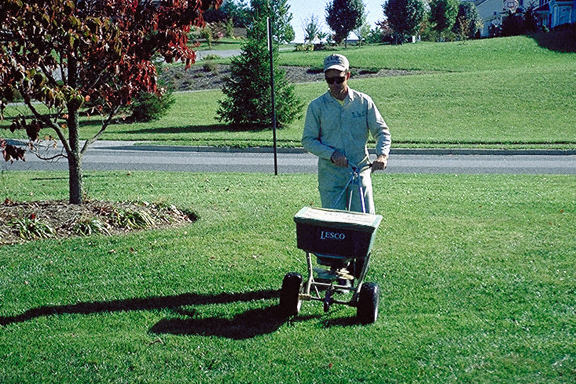Selecting a Lawn Service Company
Do you know what things to look for when you're choosing a new lawn service company? Learn what questions to ask.

Mike Goatley, Extension Turfgrass Specialist, Virginia Tech
Derik Cataldi, Urban Nutrient Management Specialist, Virginia Department of Conservation and Recreation
Late winter and early spring is a great time to start thinking about lawn and landscape management and this might be the year that you want to add and/or update a professional service firm to assist in the maintenance or management of your property. What should you be looking for? There’s a lot more to selecting quality firm than cost so let’s cover a few of the basic questions and considerations in selecting a lawn service company that is best for you.
Different companies offer different services so be sure to distinguish what it is you are looking for in a service provider. Many firms offer only standard mowing and edging/trimming services. Total lawn care firms offer an extensive set of options in lawn-specific management, while a total landscape management firm offers expertise in not only lawn management, but also the maintenance and management of trees, shrubs, ornamentals etc. As part of your fact-finding, always be on the lookout for a reputable firm with a track record of success or documented qualifications by its ownership and employees. Reputable firms will not shy away from answering your questions about their programs, your specific needs, their qualification etc. Reputable lawn service firms will employ certified pesticide applicators and fertilizer applicators and it should be no bother at all for you to request confirmation of these certifications and/or pertinent licenses. A reputable firm WANTS you to seek such information. And one thing I notice – the good firms train their employees to get all fertilizers, pesticides, and grass clippings off the streets, sidewalks, and driveways. If they don’t do it, make sure that anyone that you employ knows how important it is to blow, sweep etc. those materials back into the lawn in order to protect water quality.
Being specific to lawn care for the purpose of this podcast, what kinds of lawn care services are you interested in/or are provided? Fertilization? Pest control? Seeding and renovation? Cultivation? There will likely be a variety of options available that you will have to select from. What kind of services do you need? Are you comfortable with synthetic chemical and fertilizer applications? Are you looking for management approaches that favor more biological/organic lawn care approaches? What are the firm’s strategies for making decisions about pest management (aka do they treat only after a pest occurs on a curative basis, do they treat preventively, or do you choose a strategy when you enroll?). You can find a variety of topics on BMPs in lawn care on this Turf and Garden Tips webpage to help you make an informed decision about what you need AND the right kinds of questions to ask a lawn care provider that ensures you are working with a professional.
Most of the time it is best to do business with someone that pays your site a visit and offers an assessment of your property before you enter into a contract. In particular, I think it is only logical that one of the first steps any lawn service company would make before initiating a fertility program would be to conduct a soil test. Those data will become the basis for future liming and fertility needs.
I mentioned a little bit before about water quality protection and this is something that I hope your lawn care professional has already done (or if not, that you will encourage them to do so). Partner with the Virginia Department of Conservation and Recreation and their Water Quality Agreement program. It demonstrates their commitment to protecting the environment, gives them some free publicity from DCR, enhances their professionalism, and provides DCR with important information about acreage under nutrient management plans that is required by the EPA. If your service provider is not a participant, tell them they should become a partner! For more information about the Water Quality Agreement program or the Turf and the Landscape Certification program, contact DCR's urban nutrient management specialist, Derik Cataldi, derik.cataldi@dcr.virginia.gov, 804-371-7489.


